THE BOSS’ DRIVER

Sergeant Sandra ‘Sandy’ McInerney OAM was the first female ever appointed driver to the highest-ranking officer in the land – and it didn’t happen by accident.
Behind every great man is a great woman and, while there’s no doubt Lyn Cosgrove played a very important role in supporting her man, there was another strong, dedicated woman behind General Peter Cosgrove. Although ‘behind’ is more a figure of speech, given that Sergeant Sandy McInerney was usually in front of her boss – and behind the wheel of his car.
Sandy McInerney joined the Army in a time of change. She completed recruit training at Kapooka in 1986, just months after WRAAC (Women’s Royal Australian Army Corps) was discontinued as a separate stream. She completed basic driver training at Puckapunyal and was posted to the now disbanded Sydney Transport Unit, doing courier runs, medical/dental runs and picking up food from Moorebank to take to the various messes around Sydney.
During this early part of her career, Sandy was offered a short stint driving the Chief of Staff of the then Headquarters Field Force Command where her skills were appreciated. So much so, she was temporarily transferred to the headquarters for almost two years before actually being posted there for a further 18 months.
During this time she drove for such up-and-coming commanders as Brigadiers Mike Harris, John Sanderson and Frank Hickling.
Also during this period, Sandy had been allocated on an as-needs basis to drive General John Grey, then Chief of the General Staff (now known as Chief of Army), whenever he visited Sydney. Driving a VIP from one appointment to another naturally affords certain opportunities – if only politely answering the man’s questions – to tell the “boss” about one’s ambitions, and it was thus that the Chief of the General Staff became aware that Sandy had a desire to be the first female to reach the top in her profession.
And so, when the call eventually came from Canberra, Sandy was ready.
She was, by this time a corporal, but driving the CGS was a sergeant’s job. Nonetheless, General Grey was happy with Sandy’s capabilities and, more importantly, had already established a strong rapport with her on his various Sydney trips.
She was transferred to Canberra on Higher Duties Allowance, fulfilling her career ambition – to that point.
Sandy was well established as the Chief of Army’s driver when Lieutenant General Peter Cosgrove was appointed.
Choosing his staff was his prerogative and, probably in consultation with his predecessor, Sandy was asked to remain as driver to the new Chief of Army.
Eventually, when Peter Cosgrove was promoted and appointed Chief of Defence Force, Sandy McInerney was invited to remain on his staff, thus becoming the first female driver to the very top office in military command – and an honour that she says was probably one of the greatest pats on the back she every received.
So what is it to be a VIP driver? Is it a matter of simply getting behind the wheel of a car and taking the boss where he wants or needs to be?
Obviously, driving is a key element of the job, and as driver to one of the most high-profile officers in Australia, Sandy McInerney was one of the most qualified drivers in the country.
“Before the Olympic Games in Sydney, there were very few people who were, what we call Level 6, which is an anti-terrorist driving qualification,” Sandy Says.
“Level 6 is required to drive Her Majesty the Queen. The Governor General’s drivers and PM’s drivers are all Level 6 too. And it then came down to me as well.
“Level 6 involves the ‘Crash and Bang’ course, teaching you to disable other vehicles without disabling your own. It’s about hitting a vehicle at speed, to move it out of the way without completely wrecking your own car, so you can get the principal out of there as quickly as possible – safely – still alive.
“It was a painful course because you are smashing into other vehicles. You wear neck braces and harnesses, but after a couple of days hitting other cars, it can really hurt!
“I actually broke my collar bone on that course, from the seat belt repeatedly locking.”
But was it fun?
“Hell, yeah!” she says with a wicked glint in her eye.
“I’ve also done bomb search courses – being aware of how, why and what if. Also, what to look for when travelling and always being aware of what people might do and what is happening around you. I was taught all that.
“Constantly being aware of your surroundings, especially after September 11 – who’s around you, the interest they might hold – that’s a big thing. Especially with Cossie, that was difficult, because everyone was interested in him.”
Twice in her career (before Cosgrove), Sandy was forced to put her training into action – both times in Sydney.
“The first incident was a Vietnam veteran on the lead-up to the welcome home parade in 1987. He sprawled himself on the bonnet of the car and pulled out a pistol. He was quite inebriated at the time, so only managed to take out a shop window behind me.
“The second one was during the NSW bicentennial, a year later, when a couple of kids decided to take a pot shot at a nice big green car. I had three police motorcycles as an escort at the time and they were able to get on top of the situation pretty quickly.
“When it happens, the training kicks in and you just get the boss out of there as quickly as possible. It’s only later, when you are relaxing over a cup of tea or something, that it really hits you.”
But it wasn’t all driving.
Essentially, Sandy says, she worked in an office environment and was part of the boss’ team, his staff. As such, she was a spare pair of hands to help out with anything and everything.
“We all worked as a team – the CDF ran the Defence Force and we ran him!”
She was on standby to do anything at the drop of a hat – take briefs to and from Parliament House, drop other people to and from wherever the boss was, ensure Mrs Cosgrove knew what was going on – a big responsibility – and that she was where she was meant to be, at the right time and dressed appropriately for the occasion.
Or it could be the simple things like organising a hair cut for the boss, or supervising the installation of a new TV – because he just didn’t have time.
Other duties involved official gifts of protocol, for example. If the boss was going overseas, Sandy organised all the gifts he would be required to present.
“When the Cosgroves travelled for three weeks overseas they needed three or four suitcases just full of gifts. With advice from both of them, I went shopping, bought the gifts, registered them, wrapped them and packed them.
“And when reciprocal gifts came back from overseas, I had to register and look after those. Gifts were a big issue.”
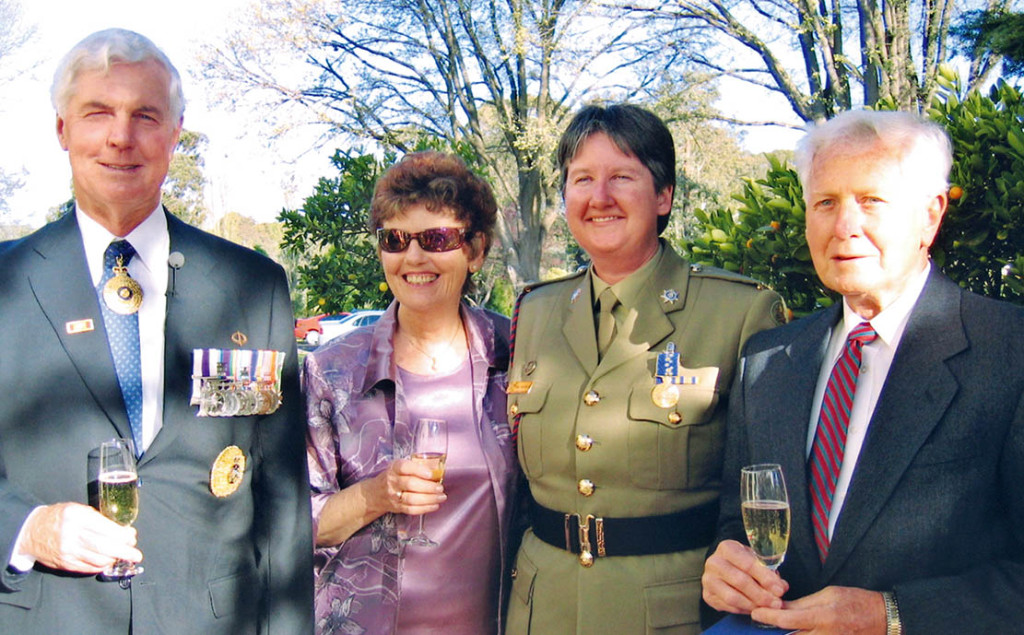
For Sandy – and all the general’s staff – there was no such thing as an ‘average’ week.
“You had to be completely flexible. I was ruled by a man’s diary, but I wasn’t even married to him. His diary ruled my life.
“It was very time consuming. Work always came first. I was single for nine years, and that was a choice I made because work took up everything.
“If he was going overseas for three weeks it was relatively safe for me to take some leave, but even then, his life could change my plans. I was out on a 200-acre property helping with maintenance when September 11 happened, and we were all back at work within 12 hours, with the boss flying back from overseas.
“In 2001, as another example, it was the Army’s Centenary, and Cossie was Australian of the Year as well. There was a time when I was averaging 130 hours per week – but I was the lucky one. I only had to get him from point A to point B – he then had to give a speech.
“He had to work for his supper, so to speak.”
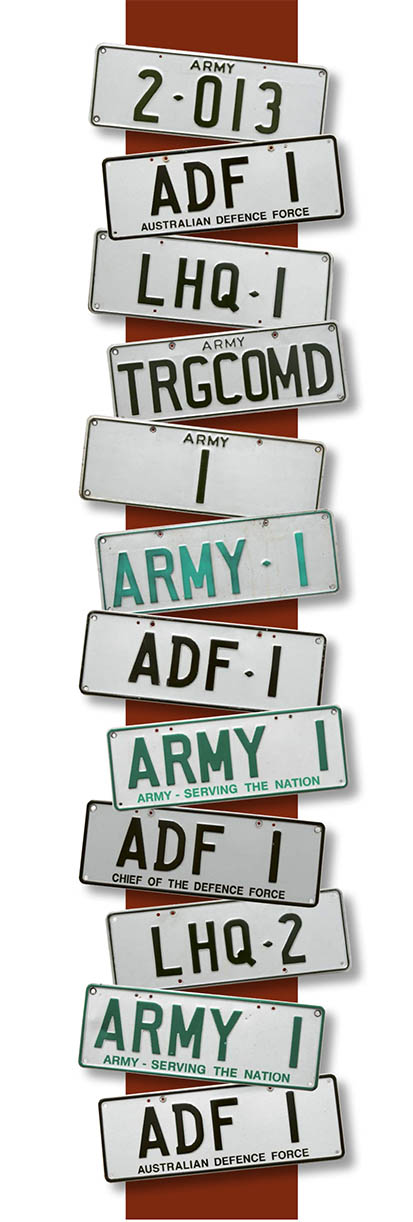 Naturally, as with most things military, there are certain protocols to be observed with a general’s staff car. Apart from the “ADF 1” number plates, which identify the car as the most important vehicle in the known (Australian military) universe, the general also has ‘star’ plates which are either covered or uncovered, depending on whether he is present or not. When on board, no matter what he’s wearing, the general’s star plates are uncovered and, whenever so, military members are required to salute the car (actually the general) as if they were meeting him on foot. He, of course, returns the compliment – the driver assisting by calling “to the left, sir”, or “to the right, sir”, more often than not calling his attention away from important briefing papers.
Naturally, as with most things military, there are certain protocols to be observed with a general’s staff car. Apart from the “ADF 1” number plates, which identify the car as the most important vehicle in the known (Australian military) universe, the general also has ‘star’ plates which are either covered or uncovered, depending on whether he is present or not. When on board, no matter what he’s wearing, the general’s star plates are uncovered and, whenever so, military members are required to salute the car (actually the general) as if they were meeting him on foot. He, of course, returns the compliment – the driver assisting by calling “to the left, sir”, or “to the right, sir”, more often than not calling his attention away from important briefing papers.
Although he is also entitled to fly his flag, or pennant, on the front of the car when he is in it, Peter Cosgrove chose not to as a rule, except on ceremonial or official occasions. Unfurling and then securing the flag each time the door opened, was a major logistical incumbrance, especially, for example, if dropping him on a busy city street.
After September 11, Sandy travelled with Peter Cosgrove more than ever before, because of her extra VIP driving qualifications. On many such trips, Sandy went ahead, arriving a day earlier to ensure arrangements were in place. This sometimes caused a stir, and gave Sandy more than a few smiles during her long tenure.
“Yes! People do panic a bit when they see that car. Especially in ADF 1 and driving interstate, I would pull in to a barracks where they were expecting the boss a day later…
“The general’s driver is usually treated very well. I’m probably the best-treated sergeant in the Australian Army. Nobody upsets the general’s driver – if they do, they only do it once!
“But it’s not something you abuse. For example, if I go into the Q-store to get him something, then I tell the storemen, “This is for the boss”. But if I were going into the Q-store to get something for myself, then there’s no ifs or buts – I’d tell them straight off. You just don’t abuse that position.
“But, people do know who you are and what you do, and they treat you differently because of it. So, I also think its good to go over afterwards and say, ‘Thanks’.
“Cossie was very good at that too. He was a very human person, very easy-going. Which was incredible, because he really did have the weight of the world on his shoulders.
“But he still found time to talk to people. He’d often rock up and plonk himself on someone’s desk and say, “G’day. How are you?”.
“He was very easy going and very easy to approach, which made my life a lot easier.”
After 20 years in the Australian Regular Army – 18 as a VIP driver – Sergeant Sandra ‘Sandy’ McInerney OAM hung up her driving gloves.
Reflecting on a career she sums up as ‘fun’, Sandy says that to work for the Chief of the Defence Force and when he asks you, “What do you think”, you knew he was interested in your opinion. That was a real buzz.
“Things that I heard in the car back in 1988, ‘89, ‘90 – that in 2006, the Australian soldier will be wearing this and will have that piece of equipment – and now I can see it in my wardrobe or with the boys out in the field. That was insightful.
“You get to see the human side of it and you get to see why things happen the way they do – why the decisions were made.
“And it was fun. The boss and I would crack each other up in the car, and Mrs Cosgrove would sit back in despair and say, “Don’t feed the monkey”.
“I really have enjoyed it, but I’ve come to the end. I can go no further, and I’m ready now for a new challenge, which, unfortunately, is outside the Army.”
Asked to impart one last piece of advice to young soldiers – and, indeed, sailors and airmen and women – Sandy says, “Just stick to it and tell people what you want”.
“Brigadier Geoff Carter – who became Major General Carter and who, unfortunately, has passed away since – said to me once, “Tell everyone what you want to do”. So when General Grey gave me that opportunity, I took it. I’d never met the man before, I was a young private and when he asked me what I wanted to do, I said I want to be the CGS’s driver.
“I started off driving a one-star and was fortunate enough to drive a two-star. I was the first female three-star driver and then the first female four-star driver.
“And, while that was a natural progression with all the experience I’d gathered over the years, it all started because I took some good advice and ran with it.”
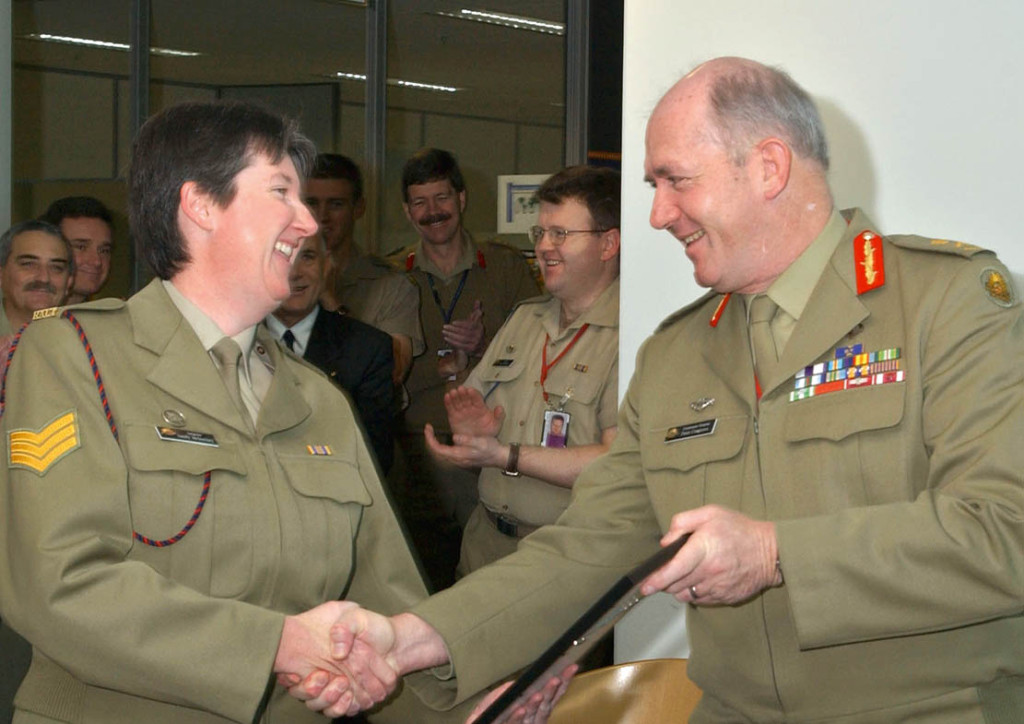
Tips to being a good VIP driver
> Be on time
> Be discrete
> Be completely flexible
> Be organised
> Keep the car clean
> Don’t embarrass yourself in public
> Use common sense
> Stay two steps ahead
.
.

.
.

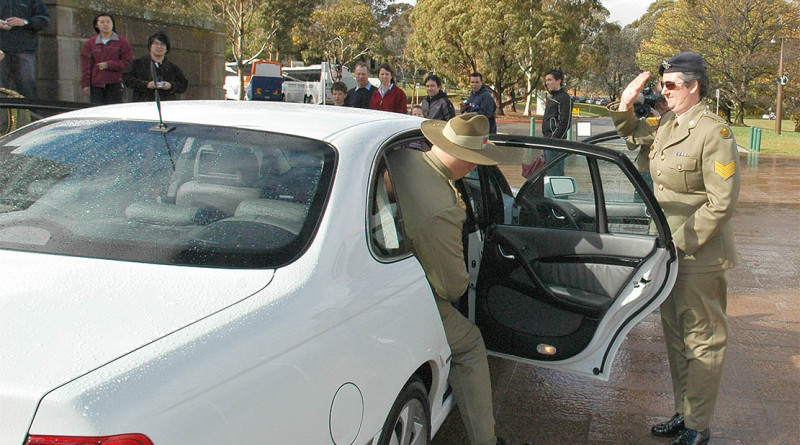
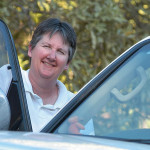

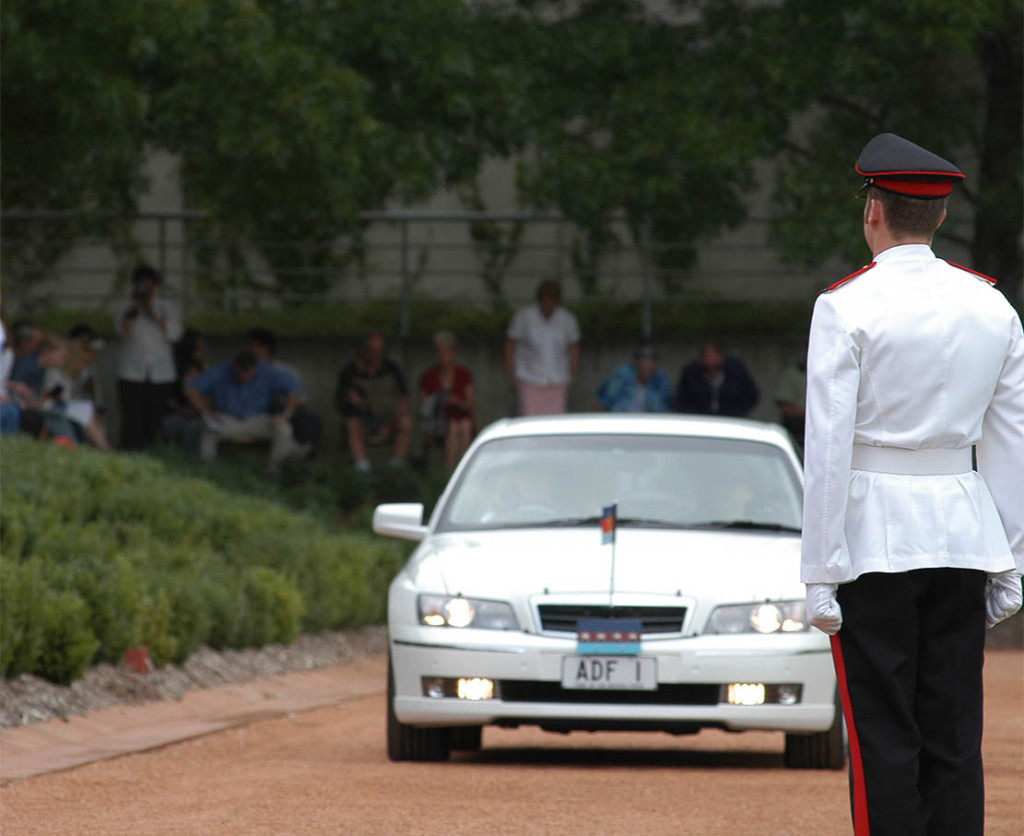

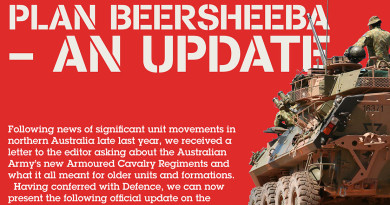
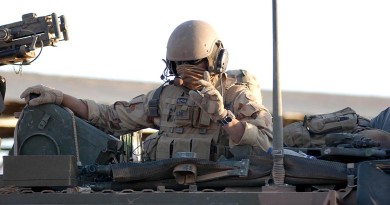
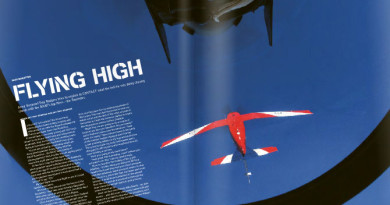
I have just read the story and find it fasciinating. I met a relative of Sandy’s today, at that stage did not know her name. Came home and googled General Cosgrove’s driver and found that I have me Sandy and spoken on the phone to her several times. I worked at Army Staff College Queenscliff. Know General Grey and his wife very well. And know her parents Mike Jeffrey and his wife. Sandy I enjoyed your story and brings me back to working at Queenscliff and the Commandan’ts Drivers were all devoted to their posistions. Then the Batmen who looked after his personal items. Fascinating read thank you Sandy and Congratulations on you Award. Small world when we start reminiscing.
Wonderful article!
awesome story really enjoyed the read 🙂
Thanks Levi.
I went through Kapooka Delta Coy from Jul – Sep 1985. And we weren’t the first female Pl either. Please check your facts. As misstating dates invalidated all that hard bloody yakka those women put in for those that followed.
Amanda. I’m sorry you feel so negative about this story. However I can’t find any quoted ‘facts’ that could possibly ‘invalidate’ anyones service. The only relevant ‘date’ I can see is “… completed recruit training at Kapooka in 1986, just months after WRAAC…”.
WRAAC was disbanded in 1984 (and I don’t know exactly which month) and Sandy marched out in 1986 (and again I don’t know exactly which month). That means my ‘just months’ would still be accurate anywhere between 13 and 24 – which isn’t an unreasonable span 30 years after the fact.
Semantics and defensiveness aside, there was no intention whatsoever on my part or Sandy’s to downplay anybody’s service in the Army. In fact, this story was always meant to be positive, and I strongly defend it as such.
Brian Hartigan
Managing Editor (and author of this story)
CONTACT and COMBAT magazines
Available by free subscription from http://www.aussiecombat.com